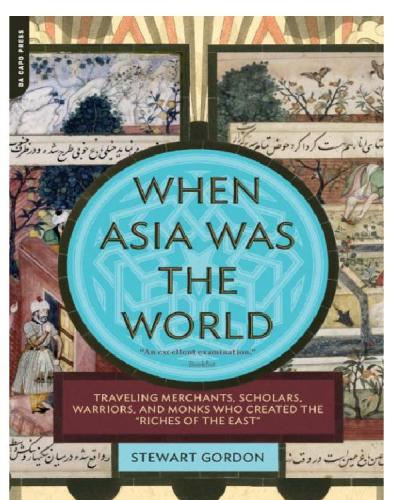
When Asia Was the World
Traveling Merchants, Scholars, Warriors, and Monks Who Created the "Riches of the "East"
کتاب های مرتبط
- اطلاعات
- نقد و بررسی
- دیدگاه کاربران
نقد و بررسی

December 3, 2007
Gordon, a Senior Research Scholar at the University of Michigan, recalls Thomas Cahill's "Hinges of History" series in this accessible history-in-portraits. Covering "the thousand years from 500 to 1500, when Asia was an astonishing, connected, and creative place," Gordon bases each chapter on the actual memoir of someone who lived, worked and traveled there. Each story has its own unique appeal, the most compelling of which is probably Abraham bin Yiju's: a Jewish spice trader living in southwestern India around 1140 CE, his life proves dramatic and transient, and his letters poignant, as in this plea for news of relatives caught up in the Crusades: "No letter... detailing who died and who remained alive, has arrived. By God, write exact details and send your letters with reliable people to soothe my mind." It's a rare joy-and a slight shock-to find such rich evidence of lives lived 1,000 years ago; given the way time erases personal history, however, it makes sense that each man's story feels incomplete. Gordon lacks the vision and distinctive voice of a Cahill, but history buffs will find this book more than worthwhile.

December 3, 2007
Gordon, a Senior Research Scholar at the University of Michigan, recalls Thomas Cahill's "Hinges of History" series in this accessible history-in-portraits. Covering "the thousand years from 500 to 1500, when Asia was an astonishing, connected, and creative place," Gordon bases each chapter on the actual memoir of someone who lived, worked and traveled there. Each story has its own unique appeal, the most compelling of which is probably Abraham bin Yiju's: a Jewish spice trader living in southwestern India around 1140 CE, his life proves dramatic and transient, and his letters poignant, as in this plea for news of relatives caught up in the Crusades: "No letter... detailing who died and who remained alive, has arrived. By God, write exact details and send your letters with reliable people to soothe my mind." It's a rare joy-and a slight shock-to find such rich evidence of lives lived 1,000 years ago; given the way time erases personal history, however, it makes sense that each man's story feels incomplete. Gordon lacks the vision and distinctive voice of a Cahill, but history buffs will find this book more than worthwhile.
Copyright 2007 Library Journal, LLC Used with permission.

December 15, 2007
After the fifth-century collapse of the Roman Empire in the west, most of Europe could be fairly described as an economic and cultural backwater for at least the next nine centuries. Meanwhile, Asia was home to prosperous, dynamic, and culturally rich civilizations, particularly in the Near East, China, and India. By describing the personal journeys and exploits of travelers between AD 700 to 1500, Gordon has shed light on several of these civilizations. Xuanzang, a Buddhist monk, wandered across Central Asia, China, and India in the seventh century, witnessing the glories of civilizations thriving under Buddhism, Hinduism, and Islam. Ibn Fadlan left Baghdad in the tenth century on a diplomatic mission that followed the caravan routes eastward and then north to the steppes of Central Asia. Ma Huan, a 32-year-old Chinese Muslim accompanied the great admiral Zheng He on his fifteenth-century epic voyage that sailed across the Indian Ocean. The adventures of these and other men form the basis of an excellent examination of civilizations whose achievements are probably unfamiliar to many in the West.(Reprinted with permission of Booklist, copyright 2007, American Library Association.)

























دیدگاه کاربران